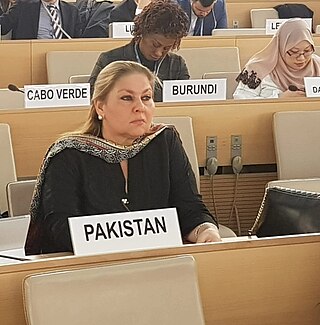Related Research Articles

The Children's Online Privacy Protection Act of 1998 (COPPA) is a United States federal law, located at 15 U.S.C. §§ 6501–6506.

Capital Development Authority is a public benefit corporation responsible for providing municipal services in Islamabad Capital Territory. The CDA was established on 14 June 1960 by an executive order entitled Pakistan Capital Regulation. As of 2016, most of CDA's municipal services and departments have been transferred to the newly created Islamabad Metropolitan Corporation. However, the CDA is still in charge of estate management, project execution and sector developments.

Internet censorship in Pakistan is government control of information sent and received using the Internet in Pakistan. There have been significant instances of website access restriction in Pakistan, most notably when YouTube was banned/blocked from 2012 to 2016. Pakistan has asked a number of social media organisations to set up local offices within the country, but this is yet to happen.
The Pakistani Constitution limits Censorship in Pakistan, but allows "reasonable restrictions in the interests of the sovereignty and integrity of Pakistan or public order or morality". Press freedom in Pakistan is limited by official censorship that restricts critical reporting and by the high level of violence against journalists. The armed forces, the judiciary, and religion are topics that frequently attract the government's attention.

Peshawar Electric Supply Company (PESCO). , is a state-owned public utility under the administrative control of the Government of Pakistan, formerly a part of the Water & Power Development Authority’s Power Wing and headquartered in Peshawar. PESCO is responsible for the distribution of electricity to over 4.4 million consumers of all civil districts of Khyber Pukhtunkhwa, Pakistan.

The Cabinet of Pakistan is a formal body composed of senior government officials chosen and led by the Prime Minister. All cabinet members sworn in are designated Minister and are seated at their respective ministries located in the Pakistan Secretariat.

The Ministry of National Health Services, Regulation and Coordination is a cabinet level ministry of the government of Pakistan with responsibility for national public health.

The Pakistan Maritime Security Agency is a branch of the Pakistan Navy. It is a Navy-managed and Navy-controlled law enforcement agency whose mission is to provide protection to the Pakistan's maritime interests and enforcement of maritime law with jurisdiction over the domestic and international waters of Pakistan including the exclusive economic zone. Pakistan Maritime security agency should not be confused with Pakistan Coast Guards which is security force under Pakistan Army.

The Ministry of Interior is a Cabinet-level ministry of the Government of Pakistan, tasked and primarily responsible for implementing the internal policies, state security, administration of internal affairs involving the state.
During late January 2012, there was a fake medicine crisis at the Punjab Institute of Cardiology (PIC) hospital in the Lahore region of Punjab, Pakistan which claimed the lives of over 100 heart patients.
Real estate in Pakistan is a growing sector of the economy of Pakistan.

Muhammad Baligh Ur Rehman is a Pakistani politician who is the former Governor of Punjab, he served in office from 30 May 2022 till 10 May 2024.

Rabiya Javeri Agha is the Chairperson of the National Commission for Human Rights (NCHR) in Pakistan, and a retired civil servant officer who served in the Government of Pakistan in BPS-22 grade as Federal Secretary. She was the first unanimously elected female President of the Pakistan Administrative Service (PAS) Officers Association, and she has had an extensive career ranging from human rights, women's development, sustainable tourism, energy, finance and trade.
The Punjab Commission on Status of Women (PCSW) is a human rights institution in Pakistan, which was established by the Government of Punjab in March 2014 under the PCSW Act, 2014. Its mandate is to work for the empowerment of women, expansion of opportunities for socio-economic development of women, and elimination of all forms of discrimination against women.
The Pakistan Single Window (PSW) stands as a prominent undertaking spearheaded by Pakistan Customs. Its overarching objective is to diminish the time and expenses associated with conducting business by transitioning Pakistan's cross-border trade into a digital realm, thereby eliminating the need for paper-based manual procedures.
The Drug Regulatory Authority of Pakistan (DRAP) is a self-governing entity under the Federal Government of Pakistan. It functions under the administrative supervision of the Ministry of National Health Services, Regulations & Coordination. DRAP was formed in accordance with the DRAP Act 2012 and is tasked with ensuring effective coordination and implementation of The Drugs Act, 1976.
The National Commission for Personal Data Protection (NCPDP) is a regulatory body established by the Government of Pakistan under the Personal Data Protection Bill 2023. The Commission is tasked with monitoring data processing activities and protecting the privacy rights of individuals.
The National Information Technology Board (NITB) is a government agency under the Ministry of Information Technology and Telecommunication in Pakistan. It was established to improve communication and operational efficiency within government organizations.
The Maryam ministry is the Provincial Cabinet of Punjab, Pakistan headed by the present Chief Minister, Maryam Nawaz. The oath-taking ceremony of Maryam as Chief Minister was held on 25 February 2024. The 18-member cabinet ministers took oath on 6 March.

After the 2024 general elections in Pakistan, Shahbaz Sharif's second government was formed. Shehbaz Sharif from the Pakistan Muslim League-N was elected as the Prime Minister. President Asif Ali Zardari took the oath of office. The new Cabinet composition has been described as a "Lean", with its composition being influenced by the need of the new government to respond quickly to the current economic crisis. The Cabinet includes PML-N, MQM(P), PML(Q), IPP and independents.
References
- ↑ "E-Safety Authority Bill: Govt Decides to Register Websites, YouTube Channels".
- ↑ "Cabinet Approves E-Safety, Personal Data Protection Bills 2023". UrduPoint.
- ↑ "Cabinet approves Personal Data Protection Bills 2023". Nation.com.pk. 27 July 2023. Retrieved 2023-08-03.
- ↑ "Government's Decision to Register Online Platforms: Establishing the E-Safety Authority". Bnn.network. 2023-07-26. Retrieved 2023-08-03.
- ↑ Ali, Kalbe (July 27, 2023). "Impact of new 'cyber laws' may be felt far and wide". DAWN.COM.
- ↑ Web Desk Daily Pakistan Global Web Desk (26 July 2023). "Pakistan plans to register websites, YouTube channels to ensure e-safety". En.dailypakistan.com.pk. Retrieved 2023-08-03.